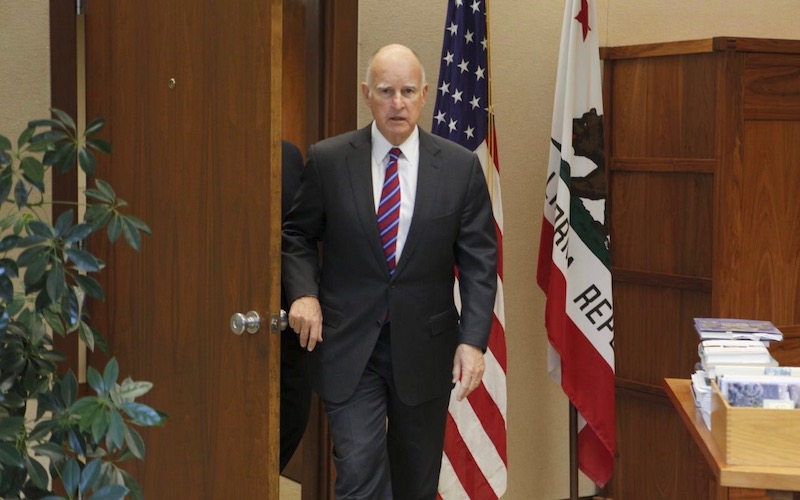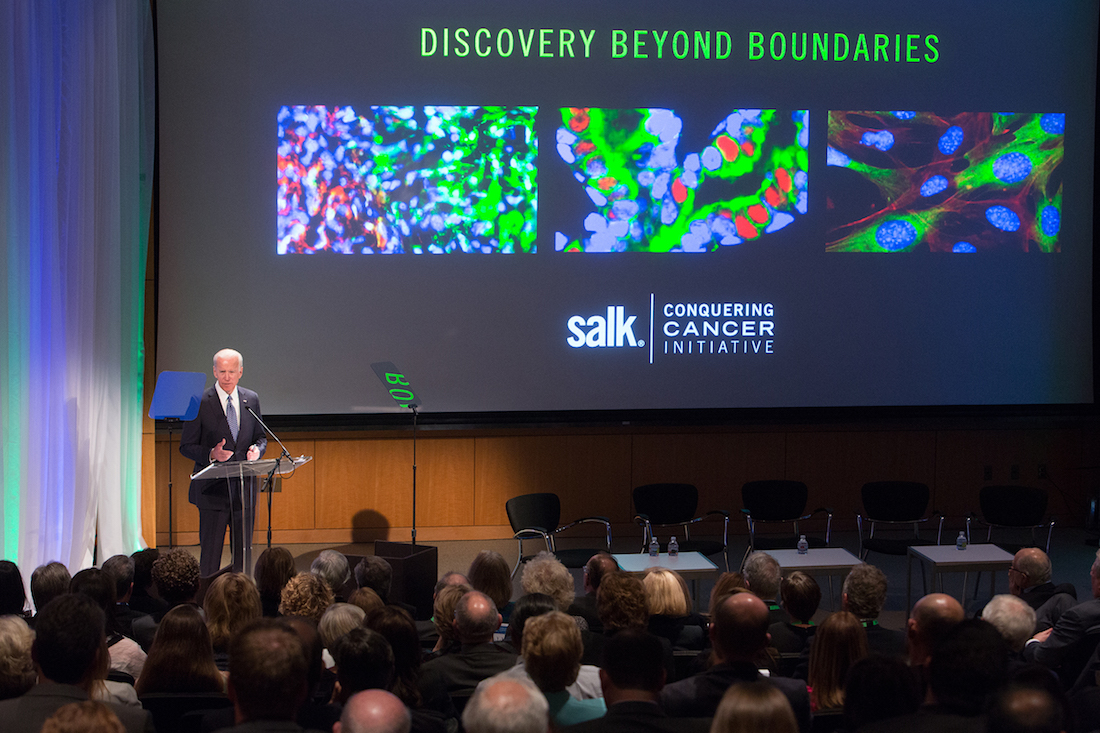Daily Business Report-Oct. 15, 2018
Gov. Jerry Brown (Photo by Max Whittaker, courtesy of CALmatters)
Commentary
Gov. Brown’s legacy will include a DMV debacle
The agency Californians love to hate
By Dan Walters | CALmatters Columnist
During his nearly 16 years as governor, Jerry Brown has displayed many attributes – some positive, some negative and some self-contradictory.
One consistent trait has been his obvious disdain for nuts-and-bolts management of a very large organizational structure. Brown prefers to explore more interesting, often abstract issues and leave day-to-day management of the bureaucracy to others.
During his first governorship, Brown’s chief of staff (and future governor himself), Gray Davis, was widely viewed as the “real governor” within the Capitol. Brown concentrated on high-concept notions and perpetual campaigns for other offices, while trusting Davis to keep the bureaucracy in line.
His lack of interest in managerial duties backfired badly in 1981 when an infestation of Mediterranean fruit flies threatened to devastate the state’s fruit tree industry.
The straightforward response would have been to fight back with insecticide, but Brown insisted on a non-chemical response of plucking the flies from trees by hand, only to reverse himself when the Legislature erupted in opposition.
The fruit fly debacle clobbered Brown’s standing in opinion polls and contributed to his rather embarrassing failure to win a U.S. Senate seat the next year.
Brown 2.0 has been more engaged in governance, but he still dislikes hands-on management and tends to shun responsibility when things go awry, such as his infamous comment of “shit happens” when serious defects in the state’s project to upgrade the Bay Bridge were revealed.
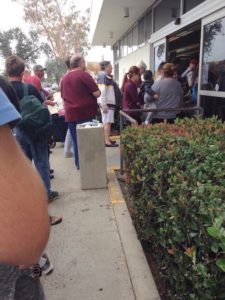
That brings us to the Department of Motor Vehicles, the state agency that Californians love to hate, most recently for being compelled to wait hours to do their legally mandated business.
Critics called for an audit of DMV operations by the notoriously tough state auditor’s office but under pressure from Brown’s office, legislators refused to approve one earlier this year.
Brown eventually ordered an internal audit by the Department of Finance, which is answerable only to him, but complaints continued and early this month, the Legislature had another hearing that concentrated on the DMV’s slow-as-molasses rollout of new driver’s licenses, called Real ID, required by the federal government.
Two years from now, Real ID will be required to board airplanes. But the DMV has issued only a tiny fraction of the 25 million required new licenses even though it has had 13 years to prepare, and is now seeking a second extension of time to comply.
“It doesn’t appear to me we’re anywhere near on track. I’m just worried about the chaos that may ensue…,” said state Sen. Ben Allen, a Santa Monica Democrat. “There’s this huge cloud out there of getting from 1.5 million to 25 million in the course of two years.”
Just a few days after that hearing, still another DMV debacle emerged – this time about automatically registering customers to vote when they do business with the agency.
DMV officials had already admitted that the agency botched 23,000 such registrations and then it was revealed last week that it had mistakenly registered about 1,500 persons in a separate incident “due to a processing error.”
The possibility, however faint, that some registrants are non-citizens fueled new, albeit unsubstantiated, allegations from the political right that California politicians want undocumented immigrants to vote. Even Secretary of State Alex Padilla, a big booster of “motor voter,” was incensed, and called for an outside investigation of the agency.
Brown has fewer than 90 days remaining in his governorship and it’s likely that as he departs, a massive managerial failure in an agency that affects the lives of virtually every Californian will still be hanging in the air.
CALmatters is a public interest journalism venture committed to explaining how California’s state Capitol works and why it matters. For more stories by Dan Walters, go to calmatters.org/commentary.
_________________________

San Diego County craft brewers bring
$1.1 billion in economic output to region
San Diego’s independent craft brewing industry continues to have a major economic impact on the region. At the 2018 San Diego Craft Beer Economic Impact Summit, held on Oct. 10, the California State University San Marcos Office of Business & Analysis, in collaboration with the San Diego Brewers Guild (SDBG), shared preliminary findings showing significant revenue growth for independent brewers in America’s Finest City. San Diego County craft brewers produced an economic impact of about $1.1 billion in output and generated about $802 million in revenue for 2017.
An additional focus of this year’s report examined the monetary impacts of community engagement. San Diego independent craft brewers’ philanthropic contributions totaled $4.9 million in 2017, supporting more than 200 nonprofit organizations in the county and 500-plus nonprofit organizations in California.
The full San Diego Craft Beer Economic Impact Report, prepared by CSUSM in collaboration with SDBG, will be released during San Diego Beer Week Nov. 2-11.
_________________________
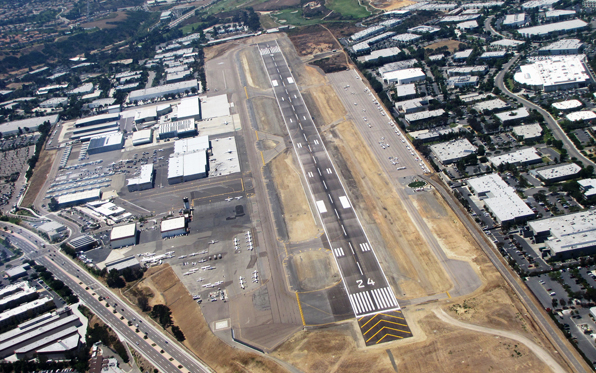
Master plan for McClellan-Palomar
Airport approved by supervisors
The San Diego County Board of Supervisors has approved a new 20-year master plan for McClellan-Palomar Airport that will enhance airport safety and make it possible for aircraft already flying in and out of it to fly farther.
The new master plan will not expand the airport but will make several improvements within McClellan-Palomar’s existing boundaries. The improvements will include shifting the runway and taxiway slightly north, ultimately extending the runway by 800 feet, and adding an “arresting system” to both ends of the runway that can safely slow airplanes in emergencies.
The board voted 4-0 to approve the new master plan. Chairwoman Kristin Gaspar recused herself.
County staff said shifting McClellan-Palomar’s runway to the north would give the larger jets and airplanes that are already landing and taking off from the airport more room to taxi safely. Extending the runway, they said, would allow those aircraft to fly farther — deeper into Europe and even to China — without refueling, by giving them the space to take off carrying more fuel than they can now.
County staff members said the master plan improvements were estimated to cost roughly $132 million, $89 million of which would be paid for by the Federal Aviation Administration.
_________________________
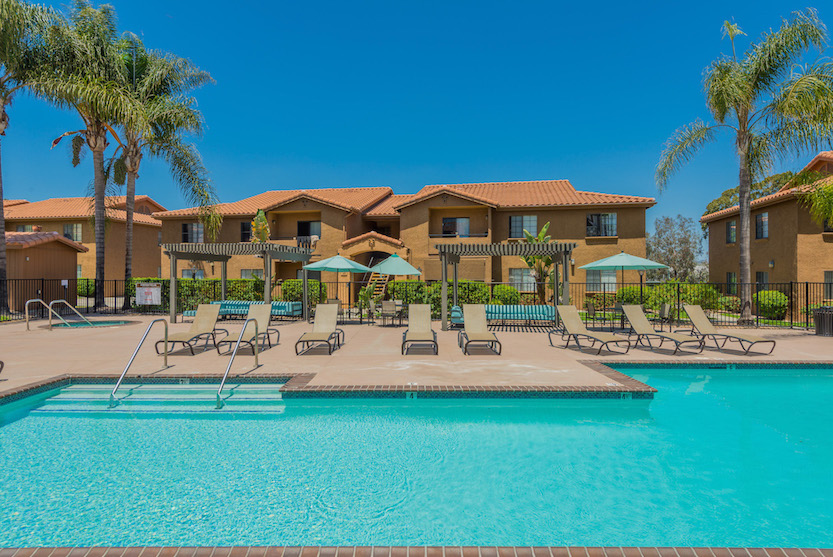
Barham Villas in San Marcos
sold to Virtu Investments LLC
Barham Villas, a 168-unit complex in San Marcos, has been sold to Virtu Investments LLC for an undisclosed price. The seller was an affiliate of MG Properties Group.
Barham Villas, located at 570 Barham Drive, is situated on 9.88 acres and was built in 1988. The two-story, low density garden-style community features Mediterranean architecture with pitched-tile roofs and garages. Ninety percent of the property consists of two and three-bedroom floor plans. Resident amenities at the property include a tennis court, half basketball court, heated pool/spa, fitness center, clubhouse, playground, pet friendly open space and two laundry facilities.
_________________________
Attorney Jared Smith honored
with Pro Bono Publico award
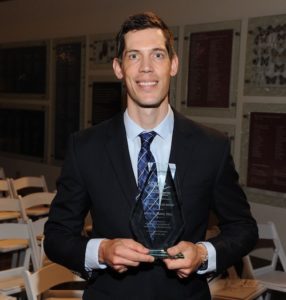
Jared Smith, an associate in the San Diego office of Fish & Richardson, has received the San Diego Volunteer Lawyer Program’s Pro Bono Publico award.
Smith was recognized for donating 269 hours of his services to SDVLP since taking on a pro bono case in September 2016. Through his volunteerism, Smith worked with a pro bono client suffering from multiple chronic health conditions, who had been denied Social Security disability benefits. A patent litigator whose practice focuses on complex issues across a wide range of technologies, Smith learned the intricacies of Social Security law to best serve his client. Ultimately, he helped establish ongoing benefits for his client, as well as back payments that were previously denied.
The award was presented at the annual Justic for All Celebration on Sept. 21.
When accepting the award, Smith called the experience the “most rewarding thing” he’s done in his career as an engineer or as a lawyer.
_________________________
Otay Water District board Ok’s 7 percent
reduction in overall average sewer rate
The Otay Water District Board approved an overall average sewer rate decrease of 7 percent for 2019. The rate decrease will take effect with sewer service billed on or after Jan. 1, 2019, and may apply to sewer service used as early as the beginning of December 2018.
The district has the sixth lowest sewer rate in San Diego County. According to a September 2018 survey of member agencies sewer rates, the district is rated with the sixth lowest rate out of 28 agencies based on 12.6 units of water and a three quarter-inch residential meter size.
The board also authorized, for a period of five years, passing through to customers the costs and increases or decreases in costs imposed by the district’s sewer service providers. The pass-through costs include rates, fees and charges for power and from the district’s treatment and disposal providers including, but not limited to San Diego Gas and Electric, the county of San Diego and the city of San Diego.
_________________________
Port continues to import soil to
Chula Vista Bayfront for future construction
The Port of San Diego has finished importing soil to the future site of the planned resort hotel and convention center on the Chula Vista Bayfront and is now importing soil to the future site of the new RV resort to be located at E Street and Bay Boulevard near the Living Coast Discovery Center. The soil is needed to improve drainage and reduce impacts to the City of Chula Vista’s wastewater treatment infrastructure.
The future RV resort is being developed by Sun Communities Inc. It will be called the Costa Vista RV Resort and will feature a total of 246 RV stalls, including traditional RV stalls and RV park models. RV park models are unique, trailer-type units which will be located onsite to provide additional accommodation options for recreation, camping or seasonal use.
The Chula Vista Bayfront resort hotel and convention center will be constructed between H and G Streets west of Marina Parkway. It will be developed by RIDA Chula Vista LLC and operated by Gaylord Hotels.

